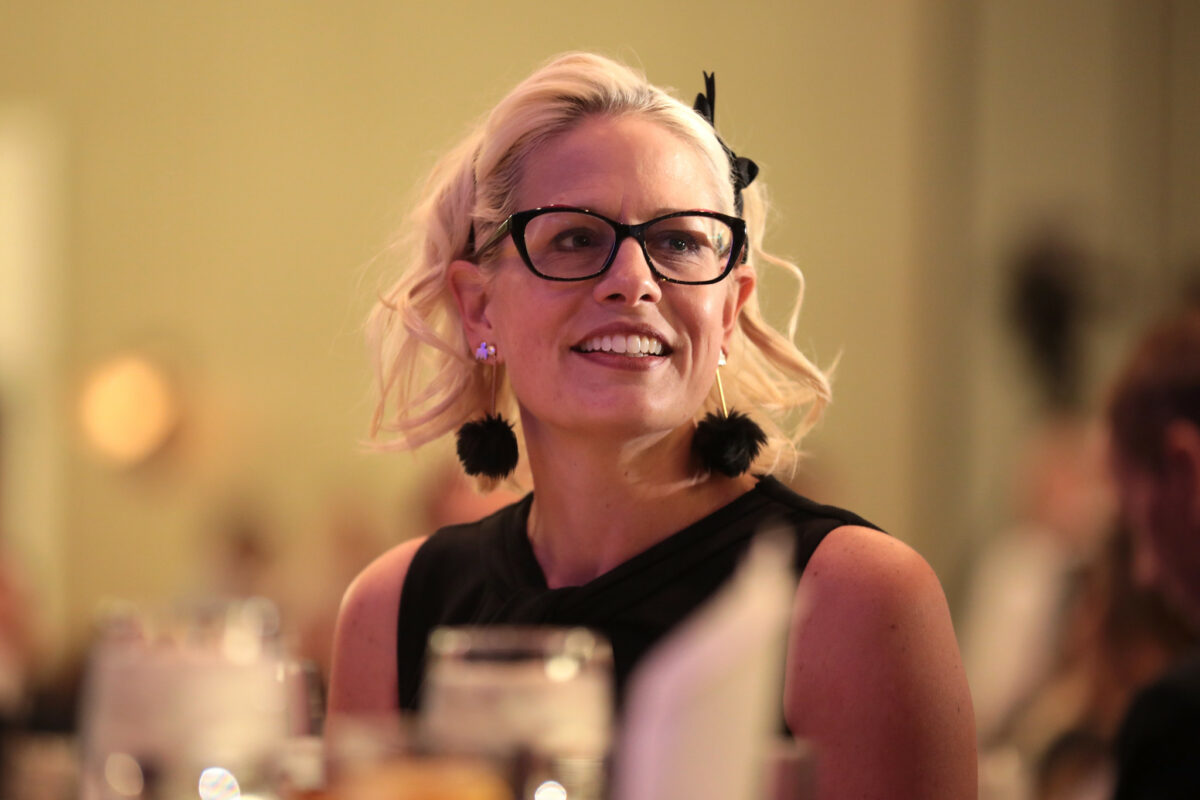Sen. Kyrsten Sinema of Arizona may be driving Democrats crazy, but she’s not on a political suicide mission—that was my takeaway from our conservation with Arizona Rep. Ruben Gallego this week during a recording of the Daily Kos podcast “The Brief.”
To some extent, Gallego and Sinema came up together through Arizona politics. Sinema was his boss in 2006 when she led the Arizona Together campaign to successfully defeat a same-sex marriage ban. They served together in the state house and later the U.S. House of Representatives, before Sinema won election to the Senate in 2018. So he has an informed personal and political history with one of Senate Democrats’ most moderate and frustrating members.
“Kyrsten has run in always very tough races,” Gallego said, explaining that she’s a believer in bringing along cross-over moderates and independents. But Gallego also expressed “real hope” that Sinema’s position would evolve on something like changing the Senate’s filibuster rule to make way for passing critical voting rights legislation.
“Our highest calling as Representatives, as Senators, should be the preservation of democracy. And when process is used to erode democracy, that’s when process has to go,” he said. “I truly believe that at the end of the day that Kyrsten understands that. She may be slow on the road to Damascus, but I think she will get there.”
Gallego’s confidence, however, flies in the face of Sinema’s oft-stated devotion to preserving the filibuster, the 60-vote procedural threshold that is effectively granting Republicans veto power over much of President Joe Biden’s domestic agenda.
“My support for retaining the 60-vote threshold is not based on the importance of any particular policy,” Sinema recently wrote in a Washington Post op-ed. “It is based on what is best for our democracy. The filibuster compels moderation and helps protect the country from wild swings between opposing policy poles.”
Still, as Gallego notes in the interview, Sinema is a political survivor, and new polling this week suggests she has reason to worry about her left flank and, specifically, a potential primary challenge in 2024.
While the polling from Bendixen & Amandi International put Sinema’s overall favorables in positive territory, 50%-37%, her favorability among Democratic voters left room for improvement, at 52%-34%. Sure, she’s 18 points above water, but compare that against Arizona’s other Democratic Senator, Mark Kelly, who’s 77 points above water with Democrats in the poll, 82%-5%.
That data tracks relatively closely with results from Civiqs polling in March putting Sinema’s favorability rating among Democratic voters at 48% while Kelly drew a 90% favorability rating from Democrats.
Sinema may like other parts of the Bendixen survey released this week: her favorability with Republicans, 51%-36%, was almost as good as with Democratic voters; and she was still above water with independents 44%-40%.
But the reality is, she will have to survive the Democratic primary in 2024, and even though she’s 18 points above water with Democratic voters right now, she enjoys nowhere near the base popularity that would insulate her from a primary challenge by a skilled politician to her left.
And this is where time will tell. Sinema can either spend the next several years of Biden’s term talking about process and tanking his agenda, or she can find her way to helping Democrats secure some major wins and earn the loyalty of the party that brought her.
“I’ve had my policy disagreements with Sen. Sinema many times,” Gallego said, “but I do think at her core she is a good Democrat and she understands that a Biden successful administration is both good for the country and good for her reelection in 2024.”
Self-preservation is written all over Sinema’s political biography—she has both evolved and moderated throughout her career, depending on what was needed to advance. Sinema has also rather skillfully made that negotiation in a state that has been in the midst of a political sea change over the last handful of years.
If the Republican Party were ascendant in Arizona, I personally wouldn’t put it past her to switch parties. But it’s not. As Gallego told us, the Arizona GOP keeps losing elections and is uniquely desperate at the moment. The sham audit ordered by Senate Republicans is little more than a fundraising ploy designed to squeeze every last penny possible out of GOP voters.
In short, Sinema needs the Democrats just as badly as Democrats need her.
That’s why, at the end of the day, I don’t believe Sinema would sink Biden’s agenda, particularly if she were the lone holdout among Senate Democrats on anything important, such as voting rights or a reconciliation package. She simply cannot afford to be to the right of Sen. Joe Manchin of West Virginia—who represents the reddest state in the caucus—and survive politically in Arizona.
That’s why Sinema will find a way to come around when and if the time is right. And that will likely be when and if she gets the sense that Manchin is prepared to help Senate Democrats cement any of Biden’s major priorities.
It’s not a pretty or enjoyable process, but Sinema isn’t the biggest threat to Biden’s agenda. Manchin is still the key to the caucus.
